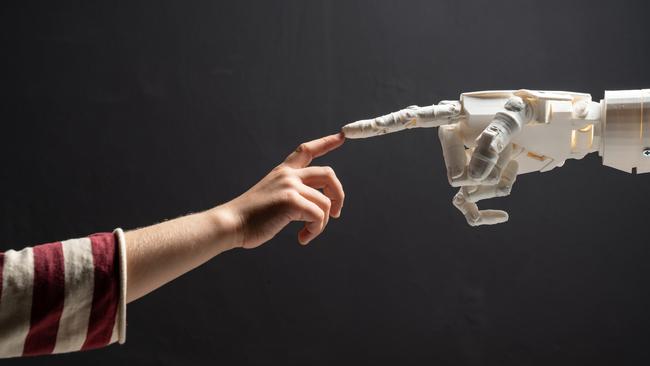Schools crack down on AI as chatbot cheats test teachers
Students will be taught ‘ethical’ ways to use artificial intelligence to write school assignments, despite three states cutting off classroom access to a popular chatbot.

Students will be taught “ethical’’ ways to use artificial intelligence to write school assignments, despite three states cutting off classroom access to a chatbot widely used for cheating.
OpenAI’s controversial ChatGPT will be demonstrated to students in a Day of AI project backed by the CSIRO and the University of NSW, and run by former Google vice-president Hugh Williams. Mr Williams said students would be taught to detect “fake news” by analysing if ChatGPT essays were correct and unbiased.
He predicted AI would create more work for teachers already groaning under heavy workloads.
He said teachers would need to give students more work to do in class, under supervision, in the place of homework that could easily be written by the emerging generation of articulate AI chatbots.
“More things need to happen in the classroom and less things need to be sent home so they can take shortcuts,’’ he said. “This will require more work from teachers.
“But we’ve got to embrace the fact this powerful new technology is here – no school blocked the World Wide Web and made kids go to the library.’’
Mr Williams, who is Melbourne Business School’s enterprise professor, is a pioneer of AI who led the worldwide product and engineering teams for Google Maps, and held executive roles at eBay, Microsoft and Tinder. He warned students could not rely on the accuracy of chatbot essays.
“You can provide it with a couple of words and a little bit of context, and it will provide lengthy and plausible text,’’ he said.
“Students need the critical thinking skills to take a piece of text and realise if it’s factual, if it’s supported by evidence, or if it’s biased.
“The ability to understand if something is factually based is becoming more and more important due to the prevalence of information on the internet.’’
NSW, Queensland and Tasmania have blocked student access to ChatGPT during school hours.
Federal Education Minister Jason Clare has also met with the university regulator, the Tertiary Education Quality and Standards Agency, to brainstorm ways to stop university students using AI to cheat.
“This can help you learn, but it can also help you cheat,’’ he told Sunrise on Friday. “We don’t want people to misuse it so they don’t get the marks they don’t deserve.
“Microsoft has just bought this technology, so it’s going to be built into everything they do – it’s not going away. Schools and unis (have) got to look at how they adapt to this new reality that this technology is here.’’
NSW Education Department spokeswoman Megan Kelly said access to generative AI applications, including ChatGPT, would be blocked on public school networks for students using school or their own digital devices, such as laptops and smartphones.
The ban would remain until the department reviews how to “safely and appropriately use this emerging technology in the classroom’’, she said. “The department will also be providing further guidance to teachers on our robust assessment practices in place to ensure all students play by the rules.”
Queensland Education said it had blocked ChatGPT technology for all students using its network until the technology could be “fully assessed’’. “Misuse of artificial intelligence by a student may be considered academic misconduct or a technology violation,’’ a spokeswoman said.
“Schools may develop their own guidelines regarding the use of AI by students. It is also important for schools to educate students about the ethical and academic implications of using AI to complete assignments.’’








To join the conversation, please log in. Don't have an account? Register
Join the conversation, you are commenting as Logout